Kirby Larson's Blog, page 23
January 7, 2014
From the Office of the Future of Reading
Please help me welcome today's guest blogger, Julee Murphy, a teacher-librarian at the Early Childhood Development Center, a dual language elementary-middle school, and an Education Specialist at Texas A&M University-Corpus Christi. She actively advocates for literacy in her community through early reading intervention programs and is a member of many professional organizations that support reading. Julee believes readers come in all ages and anyone can develop into a reader at any point in their lives. Her hobbies include reading, using technology tools to engage her students, performing science experiments at home, and entertaining her grandbabies. You can hear more from Julee by visiting her on Twitter or her blog.
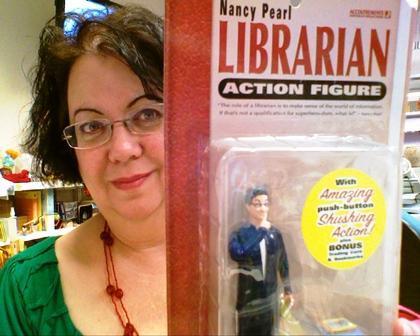
How Book Clubs Inspire Conversation, Community and Creativity
Children are not always sure how to select books or how to discover topics that might interest them. Implementing a Book Club can be an engaging way to inspire disinterested or reluctant readers to become involved readers while providing opportunities for advanced readers to discover new topics of interest.
The Bluebonnet Book Club (BBC) is a yearlong program that I started in my school that features twenty books nominated for the Texas Bluebonnet Award. The titles are a good mix of fiction, non-fiction, graphic novels, and poetry. Third through sixth grade students are challenged to read at least five nominated titles before January 31st of each year, to become eligible, along with other students across Texas, to electronically vote for their favorite title. In addition, I further challenge students to read eight or more titles and complete five book projects. If successful, they receive a coveted invitation to a celebratory BBC Breakfast filled with food, crafts, and games. Students work hard to earn this privilege.
The result of our Bluebonnet Book Club is that it promotes conversation, community, and creativity. Reading a book aloud or along with others and taking time to discuss its characters, plot, and backstory lead to rich literary conversations. Students have become inspired to read beyond the book by further researching its topics. So was the case with two books in particular.
Just Being Audrey by Margaret Cardillo inspired students to research Audrey Hepburn’s life, learning how she struggled with hunger during World War II in Nazi-occupied Netherlands and concluding that her true life experiences led to her dedicated efforts as a UNICEF ambassador bringing attention to child hunger. Students were so touched by Hepburn’s efforts that they collected money for UNICEF. As a teacher, it is very rewarding to see students take their learning and turn it into a positive change to better their community. Readers also demonstrated their creativity by highlighting Hepburn’s life and career in this example of a book project.
Bluebonnet Book Club wikipage: Just Being Audrey

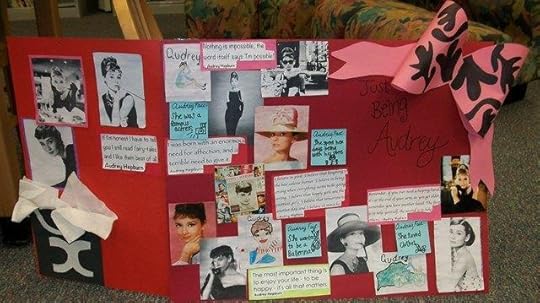
The most popular BBC lesson was All Stations! Distress! by Don Brown. Our lesson began by assigning each student the name of an actual passenger or crew member aboard the Titanic. After reading the book together and learning about Titanic's timeline from the building of the ship, to its voyage and eventual sinking, students used primary source passenger manifests to research and discover their fate that tragic night at sea. Students were curious and wanted to understand the passenger class system. They were distressed that so few lifeboats were available and those who had survived became interested in what happened to their assigned passenger later in life. Those who were lost at sea learned about body reclamation. In subsequent lessons, we learned how to use and translate Morse code and concluded by learning about the search for Titanic and its eventual discovery by explorer Bob Ballard. I provided readers with books on marine biology and oceanography and information on how they could pursue a career in these fields.

Bluebonnet Book Club wikipage: All Stations! Distress!
Through our book club, readers are discovering new interests and are sharing these with their peers. Many continue to select books to read together in their own version of mini book clubs. They have become a community of readers with important opinions and ideas to share.
Thank you Julee for sharing your experiences with us! I am so impressed with your students' generosity, as well as your resourcefulness in stretching the story far beyond the page.
Published on January 07, 2014 05:30
January 6, 2014
Starting the year with a full heart
I am so grateful to all the teachers, librarians and fellow writers who have taken time from their busy lives to write guest posts for this little blog. I just wanted to share that I have made a donation in honor of all my guest bloggers to one of my favorite causes, Orphans Africa (started by fellow writer Michele Torrey and her husband Carl Gann). If you're one of my guest bloggers, this thank you note is for you!
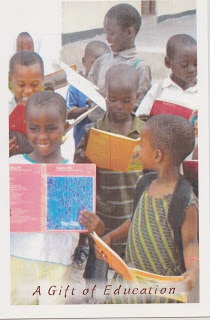
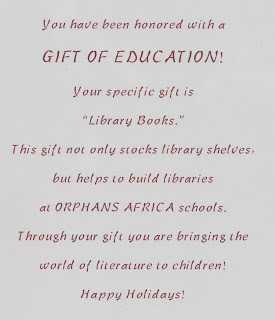


Published on January 06, 2014 05:30
January 1, 2014
Wednesday Wisdom
Published on January 01, 2014 05:30
December 31, 2013
From the Office of the Future of Reading
I just now heard from a school in Kentucky that, thanks to encouragement from the wonder woman who organizes my school appearances, Michele Kophs, has received a Target grant which will pay for nearly the entire cost of my appearance*.
This is the second time Target has helped a school that's invited me to visit. (It's not that Target thinks I'm hot stuff or anything; they would support other author appearances this way, too!). So I encourage you to apply, too. Here's the link.
Now, I'm off to enjoy the New Year at Shangri-Lar. See you in 2014!
 My happy place.
My happy place.
*Please note: this school contacted me before I took a leave of absence from doing school visits. Officially, I'm not doing them in this school year.
This is the second time Target has helped a school that's invited me to visit. (It's not that Target thinks I'm hot stuff or anything; they would support other author appearances this way, too!). So I encourage you to apply, too. Here's the link.
Now, I'm off to enjoy the New Year at Shangri-Lar. See you in 2014!
 My happy place.
My happy place.*Please note: this school contacted me before I took a leave of absence from doing school visits. Officially, I'm not doing them in this school year.
Published on December 31, 2013 05:30
December 25, 2013
Wednesday Wisdom
When one loves, one does not calculate.
St. Therese of Lisieux
St. Therese of Lisieux
Published on December 25, 2013 05:30
December 24, 2013
From the Office of the Future of Reading
Those of you who are not already in eggnog-induced laziness will have noticed that there was not a guest post this morning for the Office of the Future of Reading. That is because the teacher and librarian elves have earned some time off. So spend some quality time with your families (I certainly will be!) -- take a walk, work on a puzzle and above all, read a good book.
Come early January, we'll be raring to go here at the Office of the Future of Reading. But not too early.
Happiest of holidays to everyone. I wish you much joy and gingerbread this season!
Come early January, we'll be raring to go here at the Office of the Future of Reading. But not too early.
Happiest of holidays to everyone. I wish you much joy and gingerbread this season!
Published on December 24, 2013 12:21
December 20, 2013
Friend Friday
It is a huge honor to host Brenda Guiberson today. Brenda has not only been a writing mentor for me, she's been a dear, dear friend. Her long ago advice to me to focus on my work, and not the other crazy parts of the book biz, has saved my sanity many times. When she mentioned that she had written a book about dinosaurs, from their POV, I had to learn more.
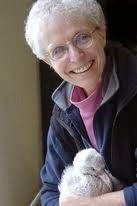 Brenda Guiberson
Brenda Guiberson
Hi all. It is an honor and pleasure to join you on Kirby’s blog.
Writing non-fiction is always fun when you love to do research and learn fascinating new things. The work comes in finding a voice that focuses details and communicates an emotional investment in the topic. How do writers go from knowing what they want to say to finding the best way to say it?
Sometimes a tough topic requires a new approach. I always wanted to write about dinosaurs but could never quite find a voice that wasn’t full of big words like therizinosaurus and leaellynasaura, and technical issues like shifting landmasses, Triassic versus Jurassic and which way the pubus was pointing. Still, every time I revisited dinosaurs, it clarified some new area of their complicated millions of years of survival. And pronunciation guides helped me with the long names that first graders seem to roll off their tongues without hesitation.
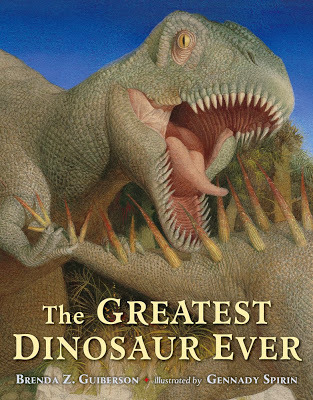
Finally I started a flow of words that eventually became my latest book, The Greatest Dinosaur Ever, illustrated by Gennady Spirin. My goal was to keep it simple- what made one classification of dinosaur different from the next and what was it about that uniqueness that made them incredible survivors? This one had the biggest teeth or the best armor, that one was a protective parent sitting on its eggs, that one lived at the bottom of the world and could hunt in the dark, etc.
The first draft was written (with revisions, of course) in third person. My editor liked it and after a discussion I rewrote it in first person. What fun! Now I had twelve dinosaurs speaking for themselves and this really upped the bragging possibilities.
“I was the greatest,” every dinosaur roars, each thinking it owns this title. Was it the tallest, the longest, the strongest, the smartest, the weirdest, the fastest, or the smallest (with feathers on both its arms and legs)? Or was it the oldest bird, the best parent, the one with the best night vision, the best armor, or the longest tail spikes? Who WAS the greatest of all? It is up to the reader to debate and perhaps look beyond the book for an answer. Every year many new dinosaurs are discovered, and they are all incredible, including the ones with feathers with colors that can be determined.
This first person voice is simple and fun and I have since written more books using this approach. One focuses on feathered dinosaurs and others let sea creatures, deadly creatures, and even a waterfall do some talking.
Is a book with bragging extinct creatures still considered non-fiction? It is. The pages are full of factual information, beautiful realistic illustrations and the book is shelved with a non-fiction number. To me any writing, fiction or non-fiction, needs a great deal of flexibility. It is always a refreshing moment to experiment with new ways to communicate content and point-of-view.
Brenda, thank you for caring so much about sharing information with kids that you'll try something new and different -- like channeling your inner T-Rex.
 Brenda Guiberson
Brenda Guiberson
Hi all. It is an honor and pleasure to join you on Kirby’s blog.
Writing non-fiction is always fun when you love to do research and learn fascinating new things. The work comes in finding a voice that focuses details and communicates an emotional investment in the topic. How do writers go from knowing what they want to say to finding the best way to say it?
Sometimes a tough topic requires a new approach. I always wanted to write about dinosaurs but could never quite find a voice that wasn’t full of big words like therizinosaurus and leaellynasaura, and technical issues like shifting landmasses, Triassic versus Jurassic and which way the pubus was pointing. Still, every time I revisited dinosaurs, it clarified some new area of their complicated millions of years of survival. And pronunciation guides helped me with the long names that first graders seem to roll off their tongues without hesitation.

Finally I started a flow of words that eventually became my latest book, The Greatest Dinosaur Ever, illustrated by Gennady Spirin. My goal was to keep it simple- what made one classification of dinosaur different from the next and what was it about that uniqueness that made them incredible survivors? This one had the biggest teeth or the best armor, that one was a protective parent sitting on its eggs, that one lived at the bottom of the world and could hunt in the dark, etc.
The first draft was written (with revisions, of course) in third person. My editor liked it and after a discussion I rewrote it in first person. What fun! Now I had twelve dinosaurs speaking for themselves and this really upped the bragging possibilities.
“I was the greatest,” every dinosaur roars, each thinking it owns this title. Was it the tallest, the longest, the strongest, the smartest, the weirdest, the fastest, or the smallest (with feathers on both its arms and legs)? Or was it the oldest bird, the best parent, the one with the best night vision, the best armor, or the longest tail spikes? Who WAS the greatest of all? It is up to the reader to debate and perhaps look beyond the book for an answer. Every year many new dinosaurs are discovered, and they are all incredible, including the ones with feathers with colors that can be determined.
This first person voice is simple and fun and I have since written more books using this approach. One focuses on feathered dinosaurs and others let sea creatures, deadly creatures, and even a waterfall do some talking.
Is a book with bragging extinct creatures still considered non-fiction? It is. The pages are full of factual information, beautiful realistic illustrations and the book is shelved with a non-fiction number. To me any writing, fiction or non-fiction, needs a great deal of flexibility. It is always a refreshing moment to experiment with new ways to communicate content and point-of-view.
Brenda, thank you for caring so much about sharing information with kids that you'll try something new and different -- like channeling your inner T-Rex.
Published on December 20, 2013 05:30
December 19, 2013
From the Office of the Future of Reading
Please join me in welcoming today's guest blogger, Ann Marie Corgill. Ann Marie has been a classroom teacher for the past twenty years and is currently teaching fourth grade at Cherokee Bend Elementary School in Birmingham, Alabama. She is a National Board Certified Teacher, a teacher contributor for Choice Literacy and Developmental Studies Center’s Collaborative Classroom Blog, and the author of Of Primary Importance: What’s Essential in Teaching Young Writers. She is an active member of the National Council of Teachers of English and currently serves on the Elementary Section Steering Committee. Ann Marie presents at international, national and local conferences, focusing best practices in writing as well as social, emotional, and academic development in the primary and middle grades.You can follow her on Twitter or follow her classroom and student work here.
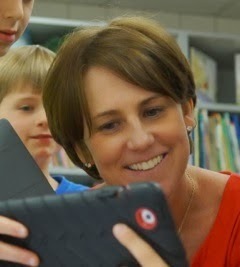 Ann Marie Corgill
Ann Marie Corgill
It Takes a Lot of Slow to Grow
And above all, watch with glittering eyes the whole world around you because the greatest secrets are always hidden in the most unlikely places. –Roald Dahl
It was one of those glorious, southern, end-of-summer mornings. Before the busy-ness of the day. Before the second cup of coffee. Before August humidity took my breath, forced me off the patio, and sent me seeking an air-conditioned space.
It was then that I noticed a metaphor for education and life crawling across a rock in my tiny garden.

A snail had found his way to the happiness rock.
Hmmm.
Mr. Snail on the happiness rock got me thinking about my teaching and learning with children.
Children’s school days need to make sense, to be filled with opportunities for play, passion, and purpose in an environment that doesn’t feel rushed. Their work and learning must be connected to the work and learning they will do for the rest of their lives. Unfortunately, with overloaded curriculum binders and standards documents, pages of meaningless data collection, unreasonable state and federal mandates, and standardized testing pressure, we, their teachers, sometimes lose sight of what’s most important.
We forget to slow down and soak in the beautiful data that’s right in front of our eyes, and we forget to teach our students to do the same.
When we’re “racing to the top” in our classrooms, no one is winning, no one is truly learning, and I doubt anyone is happy.
If we don’t slow down, we’ll miss the ah-ha moments. If we don’t make time to ask our students what matters to them, we’ll miss their stories and their passions. We’ll miss their strengths and their struggles. We’ll miss the unique ways they solve problems, create new ideas, and collaborate with their peers. We’ll miss what we can learn from children so that in turn, we can teach them wisely and well.
Below you’ll find examples of the students’ daily plans, accomplishments, and reflections on their work and learning through this past week in fourth grade. I’m spending time reading and re-reading these pieces of student writing. Their words speak volumes about their social, emotional, and academic growth. From their words, I learn what’s in their heads…and what’s in their hearts, and this is the best data I could ever ask for as I prepare for a new week of teaching and learning with this group of children.
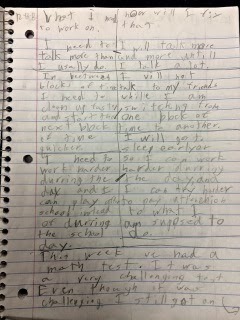
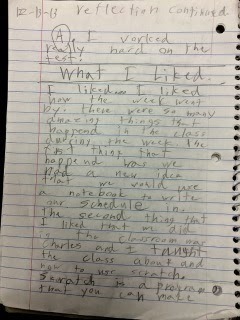
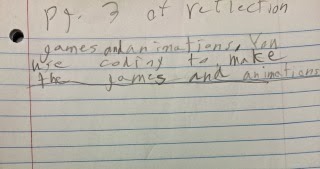
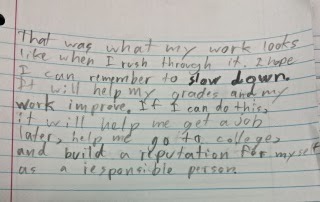
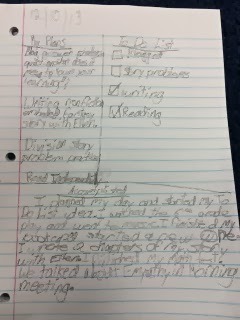
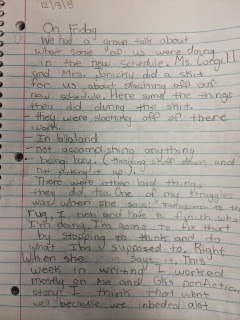
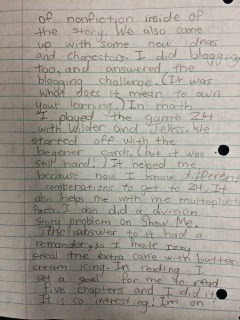
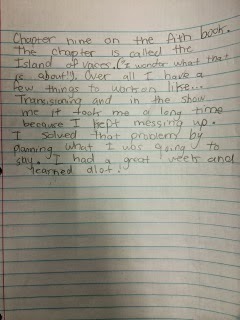
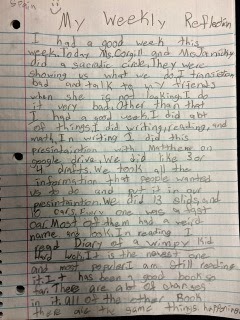
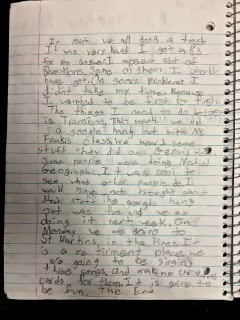
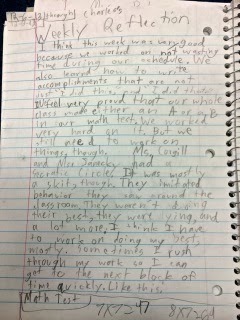
We have to slow down, prioritize, and make time for reflection for our students and ourselves. With an environment filled with possibility and support, daily tending and nurturing, and time to reflect and grow slowly, we can guarantee that our students will become forever learners who live happily ever after.
Ann Marie -- hats off to you and your students for finding ways to slow down so you don't miss the good stuff. Thanks for this timely reminder!
Published on December 19, 2013 05:30
December 18, 2013
Wednesday Wisdom
The time is always ripe to do right.
Dr. Martin Luther King, Junior
Dr. Martin Luther King, Junior
Published on December 18, 2013 05:30
December 17, 2013
From the Office of the Future of Reading
Please join me in welcoming today's guest blogger, Eve Eaton, who currently teaches first grade at Sidwell Friends Lower School after having taught fourth graders for over a decade. She enjoys sharing books with students and introducing them to new titles. In addition to her love of reading, Eve is also a regular contributor to the “iPad Adventures at Lower School” blog, which is maintained by many teachers at her school. Eve is always seeking to deepen her understanding of technology integration in the classroom and truly enjoys having the opportunity to share her experiences with others.
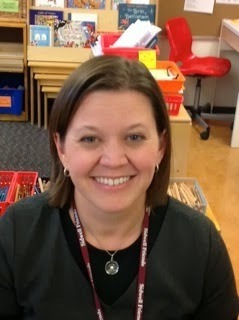 Eve Eaton
Eve EatonIt all started with a pig…
Last year, after 15 years of teaching fourth grade, I was able to re-energize my career and moved to teaching first grade. I was so excited to start something new and different! But then, on the first day of school, I was hit with the realization that I was going to have to teach our young students how to read! This is such an awesome responsibility; I wasn’t sure where to begin.
After a few weeks of testing and sometimes succeeding and sometimes failing, my co-teacher and I had a break-through. We are both experienced teachers! We actually know what we are doing! And as far as reading goes – read aloud time is one of the most important things we could do. We can discuss, ponder, enjoy good stories, learn new vocabulary and have a community experience all at once. Now…what books to share?
In teaching fourth grade for so many years, I had several favorite authors and Kate DiCamillo was certainly at the top of the list. So I went to the library, checked out Mercy Watson to the Rescue and hoped that the students in my class would like it as much as I did. Their reaction was better than I could have ever hoped for.
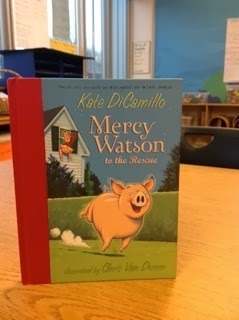
The anticipation for read aloud time was tangible every day. The students in our class were literally shaking with excitement to find out what happened next to our favorite porcine wonder. Our school librarian had to put a limit on the number of times a student in our class could renew a Mercy Watson title since everyone wanted to read those books again and again. We sat back and wondered why? Why are these books inspiring our students to want to become better readers?
First, the stories are so accessible to six and seven year olds. They love that Mercy is a pig who lives in a house. They love that she eats hot buttered toast all the time. They love that the Watsons love Mercy unconditionally and always assume the best intentions of everyone. Neighbors help each other in every book. Every story has moments of deep belly laughter. They learn new words – our class had a long discussion of “folly” one day. There is some predicable language in every book, so even our beginning readers know what is coming next. The students are so invested in the stories that they were willing to persevere with learning how to read better.
That is the magic of Mercy Watson. Students fall in love with the character and the silliness of the stories appeals to them so much that they are willing to stretch themselves in order to read the books on their own.
My co-teacher and I just started reading the series to our class this year. Our students are having the same reaction and are talking about perhaps basing our class play on Mercy Watson again. And what would we serve at the party after the play? Hot buttered toast, of course. Lots of hot buttered toast.
Thank you Eve for sharing how our favorite books can turn others into readers. And happy birthday, today!
Published on December 17, 2013 05:30



